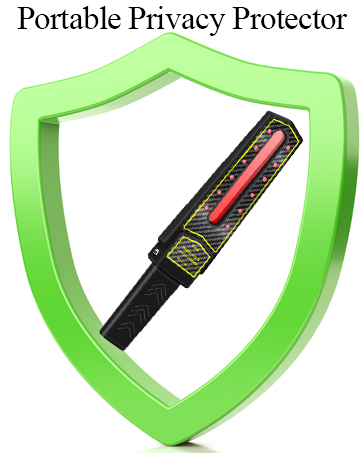Worried about unseen eyes and ears in your home? You’re not alone. In today’s technologically advanced world, the threat of hidden surveillance devices is a real concern for many homeowners. Protecting your privacy and security starts with knowing the risks and having the right tools to mitigate them. That’s where an anti-spy detector comes in – a crucial piece of equipment for ensuring your home remains a sanctuary.
Why You Need an Anti-Spy Detector
The rise of sophisticated spy cameras and listening devices makes safeguarding your privacy more challenging than ever. These devices can be incredibly small and cleverly disguised, making them nearly impossible to detect with the naked eye. From hidden cameras in innocuous objects like smoke detectors and clocks to sophisticated bugs embedded in walls, the potential for unauthorized surveillance is significant. An anti-spy detector acts as your first line of defense, providing peace of mind and allowing you to actively scan your home for potential threats. This is especially important in situations where you suspect foul play, have had previous security breaches, or simply want to ensure complete privacy within your personal space.
Understanding the Different Types of Anti-Spy Detectors

Anti-spy detectors aren’t all created equal. They utilize different technologies to detect various types of surveillance devices. Understanding these technologies is key to choosing the right detector for your needs. Common types include:
- RF (Radio Frequency) Detectors: These detectors identify wireless signals emitted by hidden cameras and listening devices that transmit data wirelessly. They’re effective against Wi-Fi enabled cameras, Bluetooth bugs, and other RF-based devices. The sensitivity of an RF detector is crucial – a highly sensitive one will pick up even weak signals from distant devices.
- GPS Detectors: Designed to locate GPS trackers, these devices are essential if you suspect someone has placed a tracking device on your vehicle or personal belongings. They detect the signals emitted by GPS trackers, helping you pinpoint their location.
- Laser Detectors: These detectors identify laser beams often used in covert surveillance systems. Laser beams can be used to remotely activate hidden cameras or microphones. A laser detector alerts you to the presence of such beams, allowing you to neutralize the threat.
- Camera Detectors: Some detectors specifically focus on identifying hidden cameras, employing various methods such as detecting the infrared (IR) light emitted by many cameras or utilizing lens detection technology to identify camera lenses concealed in everyday objects.
Factors to Consider When Choosing an Anti-Spy Detector

Selecting the right anti-spy detector involves several key considerations:
- Detection Range: The distance at which the detector can accurately identify a surveillance device. A larger detection range means you can scan a larger area more efficiently.
- Sensitivity: The ability of the detector to pick up weak signals. High sensitivity is crucial for detecting cleverly hidden devices.
- Types of Devices Detected: Ensure the detector supports the types of devices you’re most concerned about – RF, GPS, laser, cameras, etc.
- Ease of Use: Look for a detector with a user-friendly interface and clear instructions. You want a device that’s easy to operate, even if you’re not technologically savvy.
- Portability: Consider whether you need a portable device for scanning various locations within and outside your home, or if a stationary detector will suffice.
- Price: The price range of anti-spy detectors varies significantly. Consider your budget and the features you require.
Practical Tips for Using an Anti-Spy Detector

Using an anti-spy detector effectively requires a systematic approach:
- Systematic Scanning: Methodically scan your home, paying close attention to common hiding spots for surveillance devices (clocks, smoke detectors, electrical outlets, etc.).
- Multiple Passes: Perform multiple scans of each area to ensure you don’t miss anything. Small devices can be easily overlooked.
- Vary Your Approach: Change your scanning angle and distance to improve detection. A device might emit a stronger signal from one angle than another.
- Consult the Manual: Carefully read the user manual for your specific anti-spy detector. Each device has its own operating procedures and capabilities.
- Regular Scanning: Regularly scan your home, especially after any renovations or visits from unfamiliar people.
Addressing Common Concerns

Many people hesitate to use anti-spy detectors due to concerns about complexity or false positives. However, modern detectors are designed to minimize false positives and are often remarkably easy to use. A good quality detector will provide clear visual or audible alerts, indicating the presence and strength of any signal. While no detector is perfect, choosing a reputable brand and following the user instructions carefully will significantly minimize the risk of inaccurate readings.
Protecting your home from unwanted surveillance is a crucial aspect of ensuring your privacy and security. Investing in a reliable anti-spy detector is a proactive step you can take to safeguard your personal space. By understanding the different types of detectors, their functionalities, and practical usage tips, you can effectively scan your home and enjoy peace of mind, knowing your privacy is protected.


